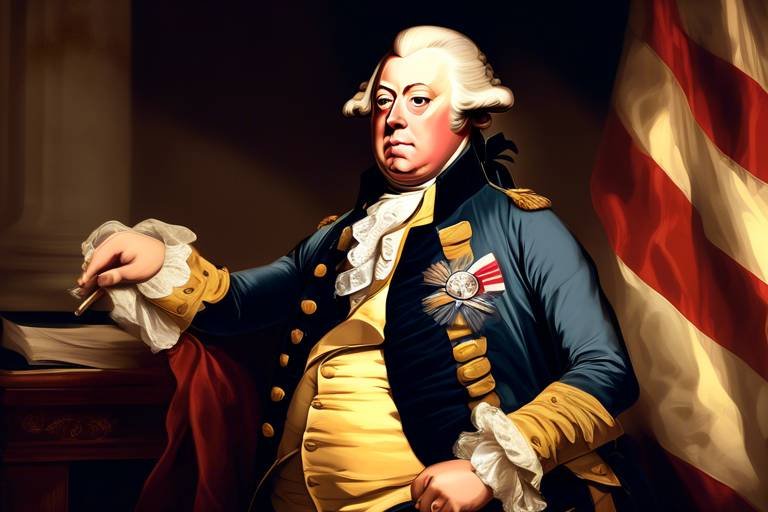Seward: The Architect of American Expansion
William Seward, known as the Architect of American Expansion, played a pivotal role in shaping the growth and influence of the United States on the global stage. Through his diplomatic prowess, strategic land acquisitions, and visionary outlook, Seward left an indelible mark on American history.

Early Life and Political Beginnings
Explore the pivotal role of William Seward in shaping American expansion through his diplomatic efforts, land acquisitions, and vision for a larger United States on the global stage.
Delve into Seward's upbringing, education, and entry into politics, setting the foundation for his future endeavors in expanding America's territory and influence.
William Seward was born on May 16, 1801, in Florida, New York, into a family of modest means. His early life was marked by a strong passion for learning and a keen interest in politics. Seward's educational journey led him to study law, and he soon established himself as a successful lawyer in New York. His political career began to take shape as he became involved in local politics, eventually rising to prominence within the Whig Party.
With a sharp intellect and a gift for oratory, Seward quickly gained a reputation as a skilled statesman. His progressive views on abolitionism and anti-slavery sentiments set him apart in the political landscape of the time. Seward's early experiences in law and politics laid the groundwork for his future role in shaping American expansion and foreign policy.
Uncover the controversial yet visionary decision by Seward to acquire Alaska from Russia, a move initially ridiculed as Seward's Folly but later recognized as a strategic masterstroke.
Examine the intricate negotiations with Russia and the fierce opposition faced by Seward in Congress and the public sphere regarding the Alaska Purchase.
Analyze Seward's broader philosophy of expansionism and his impact on American foreign policy, advocating for territorial growth and asserting U.S. interests globally.
Discuss Seward's belief in Manifest Destiny, his support for American imperialism, and the implications of his expansionist policies on domestic and international affairs.
Highlight Seward's diplomatic accomplishments beyond the Alaska Purchase, including his role in avoiding foreign intervention in the Civil War and promoting American interests abroad.
Explore Seward's efforts to strengthen ties with European powers and uphold the Monroe Doctrine, asserting U.S. influence in the Western Hemisphere and beyond.
Reflect on Seward's enduring legacy as the architect of American expansion, his contributions to shaping the nation's boundaries, and his influence on subsequent foreign policy decisions.

Alaska Purchase
Delve into one of the most controversial yet significant decisions in American history - the Alaska Purchase orchestrated by William Seward. Known as “Seward's Folly” at the time, the acquisition of Alaska from Russia in 1867 for $7.2 million was initially met with skepticism and ridicule. However, history would come to recognize it as a stroke of strategic brilliance that expanded the United States' territory and resources significantly.
The negotiations for the Alaska Purchase were complex and challenging. Seward faced staunch opposition from Congress and the public, who questioned the value of acquiring what was perceived as a frozen wasteland. However, Seward saw beyond the immediate doubts, envisioning Alaska's potential for resources, trade routes, and geopolitical significance in the future.
Despite the initial ridicule, the Alaska Purchase proved to be a visionary move. The vast territory of Alaska turned out to be rich in natural resources such as gold, oil, and fisheries, contributing immensely to the economic development of the United States. Additionally, Alaska's strategic location offered a foothold in the Pacific and enhanced American influence in the region.
Seward's foresight and determination in acquiring Alaska not only expanded the nation's borders but also set a precedent for bold and forward-thinking diplomacy. The purchase of Alaska stands as a testament to Seward's vision for a larger and more powerful United States on the global stage.

Seward's Folly
Explore the pivotal role of William Seward in shaping American expansion through his diplomatic efforts, land acquisitions, and vision for a larger United States on the global stage.
Delve into Seward's upbringing, education, and entry into politics, setting the foundation for his future endeavors in expanding America's territory and influence.
Uncover the controversial yet visionary decision by Seward to acquire Alaska from Russia, a move initially ridiculed as but later recognized as a strategic masterstroke.
Examine the intricate negotiations with Russia and the fierce opposition faced by Seward in Congress and the public sphere regarding the Alaska Purchase.
Analyze Seward's broader philosophy of expansionism and his impact on American foreign policy, advocating for territorial growth and asserting U.S. interests globally.
Discuss Seward's belief in Manifest Destiny, his support for American imperialism, and the implications of his expansionist policies on domestic and international affairs.
Highlight Seward's diplomatic accomplishments beyond the Alaska Purchase, including his role in avoiding foreign intervention in the Civil War and promoting American interests abroad.
Explore Seward's efforts to strengthen ties with European powers and uphold the Monroe Doctrine, asserting U.S. influence in the Western Hemisphere and beyond.
Reflect on Seward's enduring legacy as the architect of American expansion, his contributions to shaping the nation's boundaries, and his influence on subsequent foreign policy decisions.
William Seward's decision to purchase Alaska from Russia in 1867 was initially met with widespread ridicule and skepticism, earning it the moniker "Seward's Folly." Critics questioned the wisdom of acquiring a vast, remote territory with seemingly little immediate value. However, Seward's vision extended beyond the immediate benefits, foreseeing Alaska's strategic importance and abundant natural resources. Over time, Alaska proved to be a valuable acquisition, rich in resources such as oil, minerals, and fisheries, contributing significantly to the economic growth of the United States.
Q: What was William Seward's role in American expansion?
A: William Seward played a crucial role in expanding America's territory through diplomatic efforts, including the Alaska Purchase and advocating for territorial growth.
Q: Why was the purchase of Alaska considered controversial?
A: The purchase of Alaska was initially ridiculed as "Seward's Folly" due to skepticism about the value of the remote territory, but it later proved to be a strategic and economic success.
Q: How did Seward's expansionist policies impact American foreign policy?
A: Seward's expansionist policies, rooted in Manifest Destiny and support for American imperialism, influenced American foreign policy by asserting U.S. interests globally and shaping diplomatic relations with other countries.
Q: What is William Seward's legacy?
A: William Seward is remembered as the architect of American expansion, with his contributions shaping the nation's boundaries and influencing subsequent foreign policy decisions.

but later recognized as a strategic masterstroke.
Unveiling the controversial yet visionary decision by William Seward to acquire Alaska from Russia, a move initially ridiculed as Seward's Folly but later recognized as a strategic masterstroke, showcases the foresight and boldness of the American statesman. Despite facing significant opposition and skepticism, Seward's perseverance and belief in the long-term benefits of the acquisition ultimately proved prescient. The purchase of Alaska not only expanded the territorial boundaries of the United States but also positioned the country strategically in the Pacific region, opening up new opportunities for trade and influence.

Negotiations and Opposition
When William Seward set out to negotiate the purchase of Alaska from Russia, he faced significant opposition and skepticism both domestically and internationally. The intricate negotiations with the Russian government were met with raised eyebrows and doubts about the value of the vast, remote territory. Critics labeled the acquisition as "Seward's Folly," questioning the wisdom of investing in what seemed like a desolate and uninhabitable land. Despite the opposition, Seward persevered, believing in the strategic importance of Alaska in securing America's interests in the Pacific region.
Within Congress, Seward encountered fierce resistance from lawmakers who viewed the purchase as a wasteful expenditure of public funds. The debate over the Alaska Purchase became a battleground of conflicting interests and ideologies, with opponents arguing that the acquisition would yield little benefit to the United States. Seward's diplomatic skills were put to the test as he navigated the turbulent waters of political opposition, defending his vision for expanding American territory and influence.
Public opinion was also divided, with many Americans questioning the rationale behind acquiring a distant and seemingly barren land. Newspapers and pundits derided Seward's initiative, portraying it as a reckless and ill-conceived venture. However, as events unfolded and Alaska's strategic value became apparent, the tide of public sentiment began to shift in favor of Seward's foresight and bold decision-making.

Expansionism and Foreign Policy
William Seward's approach to expansionism and foreign policy was characterized by a bold vision of a larger and more influential United States on the global stage. His belief in the concept of Manifest Destiny fueled his advocacy for territorial growth and the assertion of American interests beyond its borders. Seward saw the expansion of the United States as not only a strategic necessity but also a moral imperative, aligning with the fervor of the times for westward expansion and the spread of American ideals.
Central to Seward's foreign policy was the idea of American exceptionalism, the notion that the United States had a unique role to play in shaping the world according to its democratic principles. This belief underpinned his support for American imperialism, as he saw the extension of U.S. influence as a means to spread democracy and secure the nation's place among the great powers of the world.
One of Seward's most significant diplomatic achievements in furthering expansionism was the Alaska Purchase from Russia in 1867. Despite initial ridicule and opposition, Seward's foresight in acquiring Alaska proved to be a strategic masterstroke, expanding American territory and resources while also securing a foothold in the Pacific that would later prove invaluable.
Furthermore, Seward's efforts extended beyond land acquisitions to shaping American foreign relations and policies. He worked tirelessly to strengthen ties with European powers, promoting diplomatic engagement and trade agreements that bolstered American interests abroad. Seward's commitment to upholding the Monroe Doctrine, which aimed to prevent European intervention in the Western Hemisphere, solidified U.S. influence in the region and signaled America's emergence as a global power.
In essence, William Seward's expansionist vision and foreign policy initiatives laid the groundwork for the United States to assert itself as a major player on the international stage. His legacy as the architect of American expansion endures as a testament to his foresight, determination, and unwavering belief in the nation's manifest destiny to shape the course of history.

Manifest Destiny and Imperial Ambitions
Manifest Destiny was more than just a catchphrase for William Seward; it was a guiding principle that shaped his policies and actions. Seward firmly believed in the idea that the expansion of the United States across the North American continent was not only inevitable but also ordained by a higher power. This concept fueled his imperial ambitions and drove his relentless pursuit of territorial growth.
Under Seward's influence, the notion of Manifest Destiny evolved into a justification for American imperialism, asserting the country's right to expand its influence and control beyond its borders. Seward saw the acquisition of new territories as essential for securing America's place on the global stage and ensuring its economic and strategic interests.
His imperial ambitions were not limited to the North American continent; Seward envisioned a United States that would rival the great empires of Europe. He advocated for the annexation of territories in the Caribbean, Central America, and the Pacific, viewing them as vital assets in expanding American power and influence.
Despite facing criticism from isolationists and anti-imperialists, Seward remained steadfast in his belief that American expansion was not only beneficial but necessary for the country's prosperity and security. His vision of a grand American empire stretching across continents reflected his bold and audacious approach to foreign policy.

Diplomatic Achievements
William Seward's diplomatic achievements extended far beyond the landmark Alaska Purchase, showcasing his prowess in navigating complex international relations and advancing American interests on the global stage. One of his notable accomplishments was his adept handling of foreign intervention during the Civil War, where Seward skillfully maintained neutrality and prevented external interference in the conflict tearing the nation apart.
Furthermore, Seward played a crucial role in promoting American interests abroad, solidifying diplomatic ties with key European powers to bolster the United States' position in the international arena. His efforts to uphold the Monroe Doctrine, which aimed to prevent European colonization in the Western Hemisphere, underscored his commitment to safeguarding U.S. sovereignty and influence in the region.
Through strategic negotiations and diplomatic finesse, Seward effectively advanced American foreign policy objectives, laying the groundwork for the nation's emergence as a formidable player on the world stage. His diplomatic acumen and vision for expanding U.S. influence beyond its borders left a lasting impact on shaping the country's role in global affairs.

European Relations and the Monroe Doctrine
When delving into William Seward's diplomatic achievements, it is impossible to overlook his significant impact on European relations and his staunch support for the Monroe Doctrine. Seward, with his strategic foresight, recognized the importance of maintaining strong ties with European powers while asserting U.S. influence in the Western Hemisphere.
Through skillful diplomacy and astute negotiation, Seward worked tirelessly to cultivate relationships with key European nations, seeking to safeguard American interests and prevent foreign intervention in the affairs of the Western Hemisphere. His efforts were not only aimed at securing economic and political stability but also at upholding the principles of the Monroe Doctrine, which declared the Americas off-limits for further colonization by European powers.
Seward's commitment to the Monroe Doctrine was a reflection of his belief in American exceptionalism and the need to protect the sovereignty of newly independent nations in the Western Hemisphere. By championing this doctrine, Seward sent a clear message to European powers that the United States would not tolerate any infringement on its sphere of influence.
Furthermore, Seward's diplomatic acumen in handling European relations played a crucial role in solidifying America's position as a rising global power. By skillfully navigating the complex web of international politics, Seward was able to assert American interests on the world stage while maintaining peaceful relations with European counterparts.

Legacy and Historical Impact
William Seward's legacy as the architect of American expansion reverberates through the annals of history, leaving an indelible mark on the nation's trajectory. His strategic foresight and unwavering commitment to territorial growth have cemented his place as a pivotal figure in shaping the United States into a global power.
One of Seward's most enduring contributions is the Alaska Purchase, a bold move that initially drew ridicule but ultimately proved to be a stroke of genius. By acquiring Alaska from Russia in 1867, Seward not only expanded America's land holdings but also secured a strategic foothold in the Pacific, paving the way for future economic and geopolitical opportunities.
Furthermore, Seward's advocacy for Manifest Destiny and American imperialism underscored his belief in the nation's divine mission to expand its influence and ideals. His unwavering commitment to this ideology shaped American foreign policy for years to come, influencing decisions that would impact both domestic affairs and international relations.
On the diplomatic front, Seward's achievements extended far beyond the Alaska Purchase. His adept navigation of European relations and steadfast defense of the Monroe Doctrine solidified America's position on the global stage, asserting its influence in the Western Hemisphere and deterring foreign intervention in the continent.
Seward's historical impact transcends mere land acquisitions and diplomatic maneuvers; his legacy lies in the enduring principles of expansionism, national sovereignty, and the pursuit of American interests on the world stage. His vision for a larger, more influential United States continues to shape the nation's identity and foreign policy priorities to this day.
Frequently Asked Questions
- What was William Seward's role in American expansion?
William Seward played a pivotal role in American expansion through his diplomatic efforts, land acquisitions, and vision for a larger United States on the global stage. His advocacy for territorial growth and assertive foreign policy significantly shaped the nation's boundaries and influence.
- Why was the Alaska Purchase considered controversial?
The Alaska Purchase, orchestrated by Seward to acquire Alaska from Russia, was initially ridiculed as "Seward's Folly" due to skepticism about the value of the territory. However, it was later recognized as a strategic masterstroke that expanded U.S. influence and access to valuable resources.
- What were some of Seward's diplomatic achievements beyond the Alaska Purchase?
Besides the Alaska Purchase, Seward successfully navigated negotiations to avoid foreign intervention in the Civil War and promoted American interests abroad. His efforts to strengthen ties with European powers and uphold the Monroe Doctrine further solidified U.S. influence in global affairs.



















